Average sizes and life expectancy for this breed:
Developed in Scotland, the Bearded Collie was bred to herd sheep and cattle across rough terrain in all weather conditions. Lovingly called the “Beardie”, this dog breed has remained popular with families because of their loving and kind demeanours. Today, they function as excellent canine companions, working sheepdogs, and show dogs.
Bearded Collies are known by several names, such as the Old Welsh Grey Sheepdog and the Highland Collie. They are intelligent, alert, and highly adaptable dogs that thrive on human companionship. These dogs love nothing more than to be with their families and get involved in everything that’s going on in the household.
If there’s one word to describe a Bearded Collie, it would be enthusiastic. This trait combined with their active, hardy, bright, reliable, trustworthy, energetic, and high-spirited natures, has seen them become popular family pets, show dogs, and hard-working herders. They are highly protective of their loved ones and are known to be incredibly gentle and affectionate with young children.
Their enthusiasm is showcased in their bouncy nature. It is said that this breed worked in thick vegetation in Scotland and would bounce up to see where the sheep were. When they were confronted by stubborn sheep, they would bark and bounce in front of them to get them moving. Nowadays, Bearded Collies continue to bounce through life with their upbeat and clownish attitudes.
See available puppies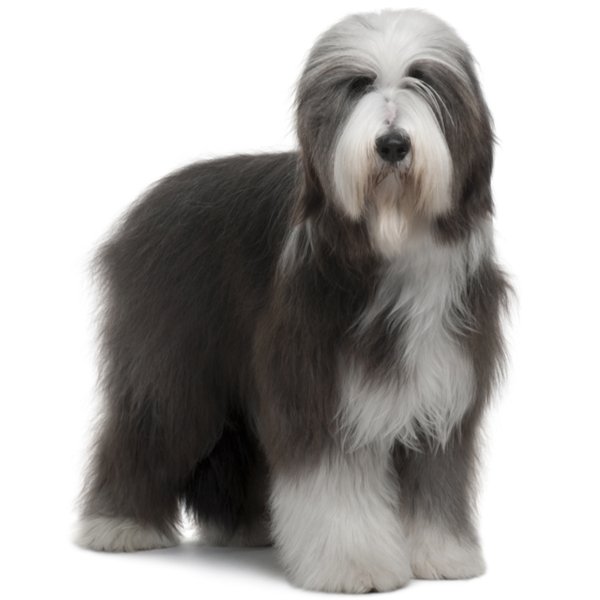

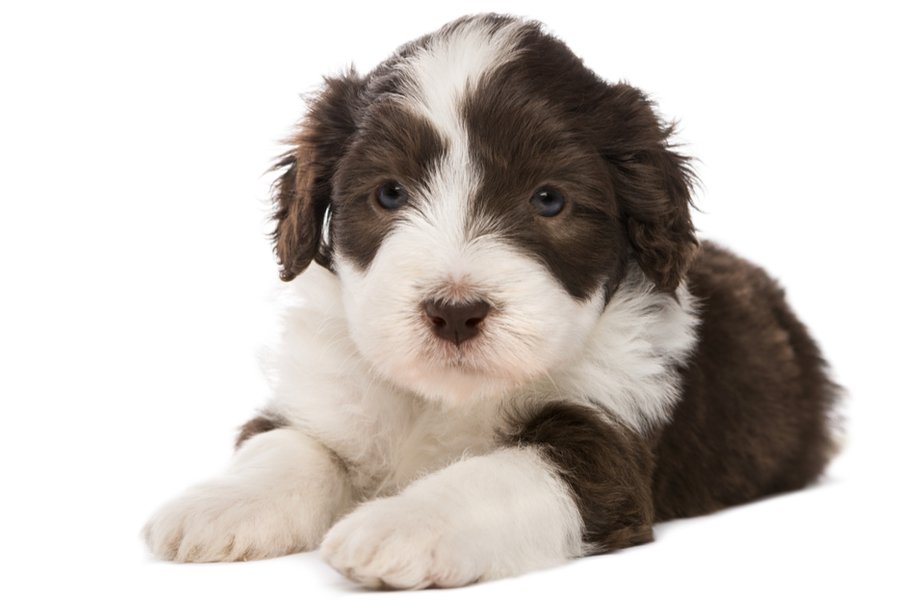


Bearded Collies are known to be one of the oldest herding breeds. There are records in Scotland of dogs that looked similar to the Bearded Collie, dating back to the 16th century. They were highly prized in Scotland and North England for their herding capabilities. Over 500 years ago, it’s believed that the dogs left behind by invading armies were bred with native herding dogs. However, the exact origin of the Bearded Collie is shrouded in mystery. Another theory is that three Polish Sheepdogs were brought over to Scotland for Roman herders, which were then bred with native dogs. The Bearded Collie is also believed to share ancestry with other breeds, such as the Pyrenean Shepherd Dog and the Briard. Over the centuries, these dogs have been known by various names including, the Mountain Scotch Collie, the Smithfield Drover, and the Hairy Mou’ed Collie. In 1891, the Bearded Collie was finally mentioned by name in the book ‘The Dogs of Scotland’ by D.J. Thomson Gray. He described the breed as:
“A big, rough, ‘tousy’ looking tyke, with a coat not unlike a doormat, the texture of the hair hard and fibry, and the ears hanging close to the head.”
Bearded Collies were bred to be working dogs for all types of livestock that could be found in mountainous regions, herding them back to the lowlands. While working in deep cover, they would perform their characteristic bounce to spot their herd. They also had a large bark which they would use to alert farmers to any potential danger. Unfortunately, at the beginning of the 20th century, they fell out of favour over Border Collies, as the latter became the preferred choice for many herders and farmers.
The number of Bearded Collies plummeted at the end of the Second World War, and the breed almost disappeared altogether. But Mrs. Williamson started a breeding programme at her Bothkennar kennels in 1944 from a female she got from Scotland and a male she got from Devon. Finally, in 1959, the Kennel Club officially recognised Bearded Collies.
In 1989, the Bearded Collie won Best in Show at the Crufts Dog Show and it made headlines. This helped them to gain popularity once more, not only in the UK but across the globe. Today, the Bearded Collie is still among the top favourites at dog shows, on the field, and in the home, thanks to their loyal, intelligent, and kind personalities.

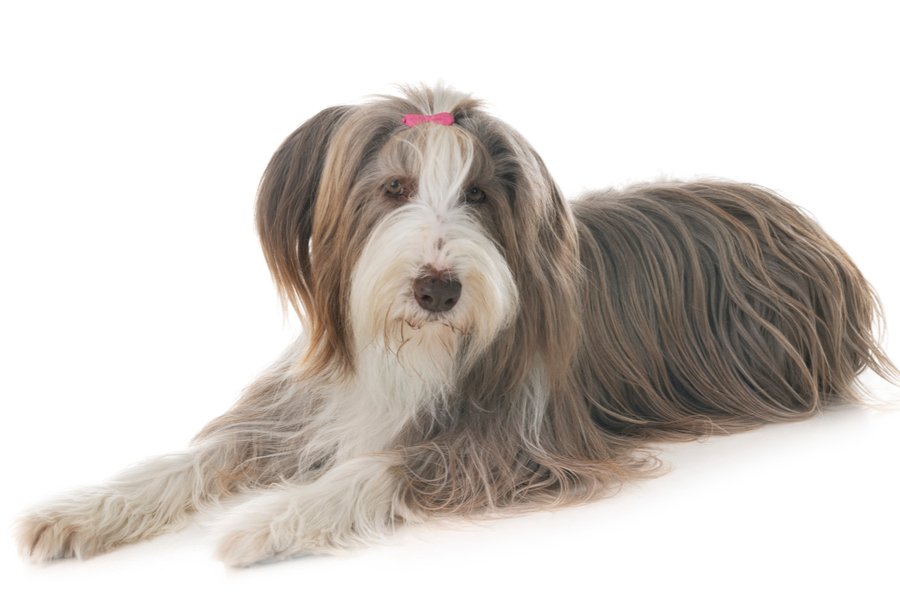
Bearded Collies are athletic-looking, lean dogs with thick, shaggy coats. They have an intelligent expression that adds to their general endearing look. Female Beardies are known to be slightly longer in the body than their male counterparts. Moreover, these dogs are well-proportioned with a flat, broad skull and a strong muzzle. Their large, square noses are black in colour, although some light-coated Beardies have lighter-coloured noses. This is acceptable as a breed standard. Their eyes are large and set far apart on the head, with arched eyebrows. Their ears are well-proportioned and held high when the dog is alert or excited. They droop down when relaxed or resting.
These dogs have a strong jawline with a perfect scissor bite. Their muscular necks are moderately long and held slightly arched. Their forequarters are strong, with straight front legs that are well-boned and covered in long shaggy hair. Bearded Collies have long, level backs and well-sprung rib cages.
Bearded Collies are known for their powerful hindquarters and well-developed second thighs. Their strong back legs are powerful with oval-shaped feet, well-cushioned pads, and arched toes that are covered in hair. Their tails are straight and set low, curving upwards at the tip.
These dogs have a double coat with a soft, furry undercoat and a very shaggy, coarser outer coat. Some dogs may have a slight wave in their coat which is permitted as a breed standard. The Bearded Collie’s coats are long and must not be trimmed. The hair on their faces is a little longer on each side of the bridge of their noses. It is longer from their cheeks and under their chin, which forms a beard. The coat comes in a myriad of colours including: Black, Blue, All shades of grey, Sandy, and Reddish-fawn.
All these coat colours can come with white markings which usually appear on their faces, tail tips, chests, legs, and feet. Slight tan markings are permissible on the eyebrows, inside the ears, under the tail, on the legs, and on the cheeks.
A self-confident and alert dog, the Bearded Collie adapts well to a home environment. They were originally bred to be working dogs, so they enjoy being busy both physically and mentally. These active dogs rarely show any sort of aggressive behaviour or nervousness. Combined with their calmness and intelligence, Bearded Collies are highly prized, not only in the UK but across the globe.
These bouncy dogs have tons of energy. They love to be active with their human companions, whether by working on the field or playing outdoors. So, they are best suited to more active families. If these dogs are left on their own for any length of time, boredom can kick in, and they may develop unwanted behaviours such as excessive barking. So, make sure that someone is home for most of the day.
Barking is, in fact, in their nature because it is one of the ways they were taught to work with livestock. So, expect your Bearded Collie to bark, especially when they are playing. These dogs make good watchdogs because they are quick to sound the alarm at any unfamiliar sight or sound.
Bearded Collies tend to excel at obedience and agility training because they love to please and genuinely enjoy the partnership with their human companions. They are very lively and spirited by nature; thus, sharing a home with a Beardie is always entertaining. It is worth noting that female Bearded Collies tend to be a bit more headstrong than their male counterparts. So, it is vital that they understand their place in the pack to prevent dominant behaviours. These dogs are independent thinkers and can be willful at times. But they are always loving and extremely loyal.

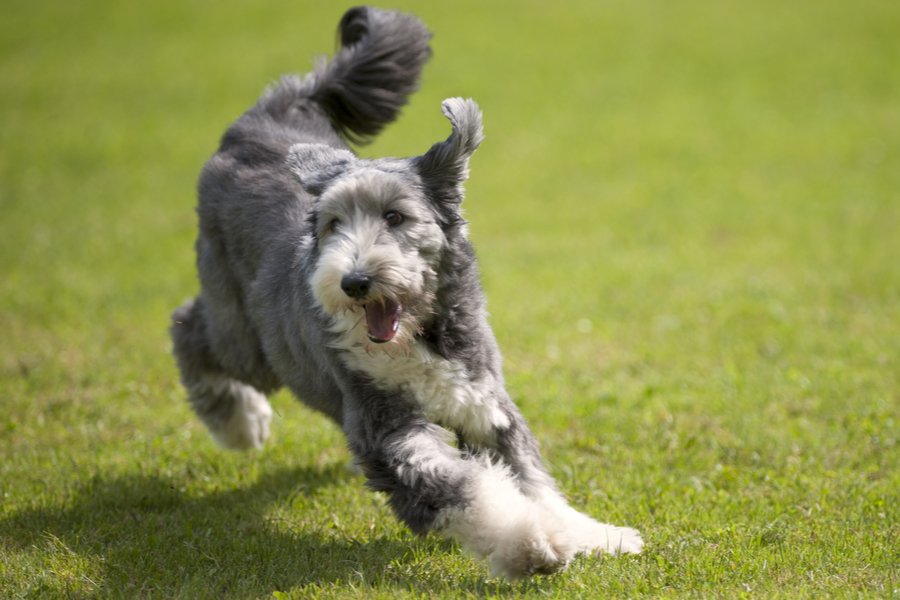
Bearded Collies are very intelligent and quick to learn. However, because of their innate stubborn streak and independent natures, training should begin as early as possible. Positive reinforcement training works best for this dog breed. Consistency, patience, and understanding are essential! You might also want to consider obedience, rally, or agility training to keep their smart minds and agile bodies busy. These dogs are at their happiest when they have something to do.
Bearded Collies enjoy playing games so make sure you keep training sessions fun to get the most out of this breed. Tug of war, hide and seek, or chase are all good options, as well as activities to simulate their brilliant minds.
Because of their long, flowing coats, Bearded Collies can be high maintenance when it comes to grooming. Their coats can quickly become matted or tangled if not brushed often. So, it is highly recommended to brush their coats every day to keep them clean and knot-free. However, brushing at least three times a week is generally considered to be sufficient. Furthermore, Beardies are messy eaters and food can cling to the long hair around their mouths. So, it’s crucial to keep them clean to avoid matting and bacteria buildup.
Bearded Collies will also benefit from having their coats professionally groomed 2-3 times a year. Like many other breeds, they tend to shed more during Spring and Autumn, so more frequent brushing is needed during these times to keep them healthy and clean.
Regular dental hygiene prevents tooth and gum diseases and bad breath. At least twice a week brushing is recommended but preferably daily. Ask your veterinarian for recommendations on which dental products work best to clean their teeth, tongue, mouth, and gums.
Trim their nails once or twice a month to keep them tidy and in good condition. Make sure you keep an eye on their nails because they can cause discomfort if they get too long. While you trim your dog’s nails, check their paw pads are dirt-free and injury-free.
Moreover, check their body as you groom your Bearded Collie for any rashes, inflammations, wounds, and other signs that they may have an infection. Your dog’s eyes must be clean, clear, and healthy without irritation or discharge.
Introduce grooming to your Bearded Collie from a young age to get them used to it. Make it a part of their training and learning, including lots of praise and rewards for good behaviour.

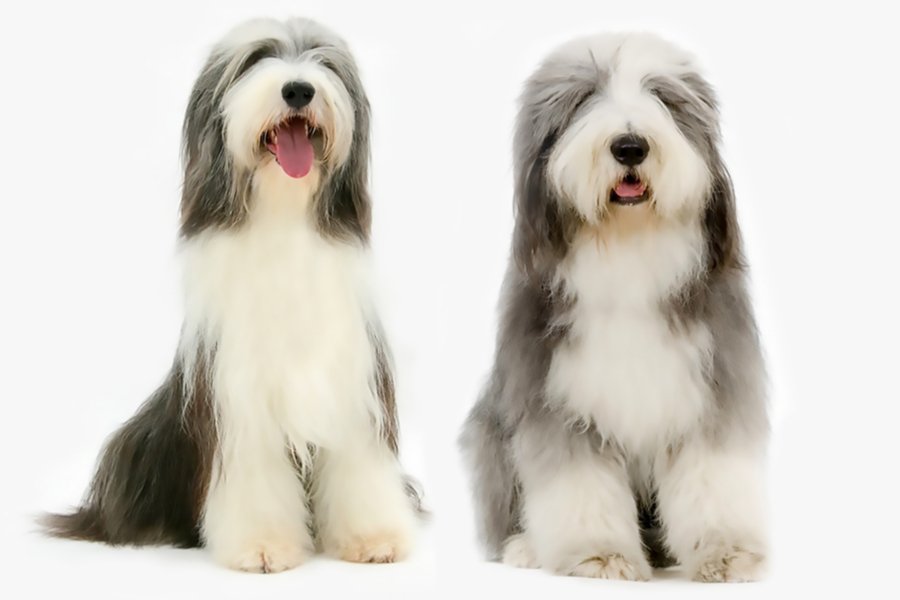
Bearded Collies can live for up to 14 years if they are appropriately cared for, fed a high-quality diet that suits their age and requirements, and given regular exercise.
These energetic and lively dogs are known to be a healthy breed. However, Bearded Collies can have some of the health conditions listed below. Always make sure you purchase a puppy from a trustworthy, licensed breeder to ensure they have been well cared for. High-quality breeders will also perform DNA tests to check for any potential health conditions.
Bearded Collies are known to be very good around children of all ages. They love to join in for some interaction and games. But, as always, it is best to supervise every interaction and playtime to prevent any accidents.
These energetic dogs are generally good around other dogs, cats, and other animals. As recommended by experts, it is best to do introductions carefully and in a controlled environment. Never rush an introduction as this can lead to problems. Also, bear in mind that these dogs have strong herding instincts so discourage them from trying to herd smaller pets and even children.

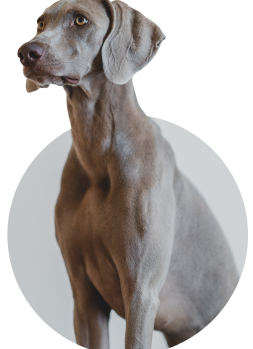
We can connect you with Breeders that are specialized in this particular breed.
See available puppies

Need some advice?
Whether you're a first time pet owner, an experienced pet owner, a new or long-time breeder, or just curious about pets, we've got you covered!
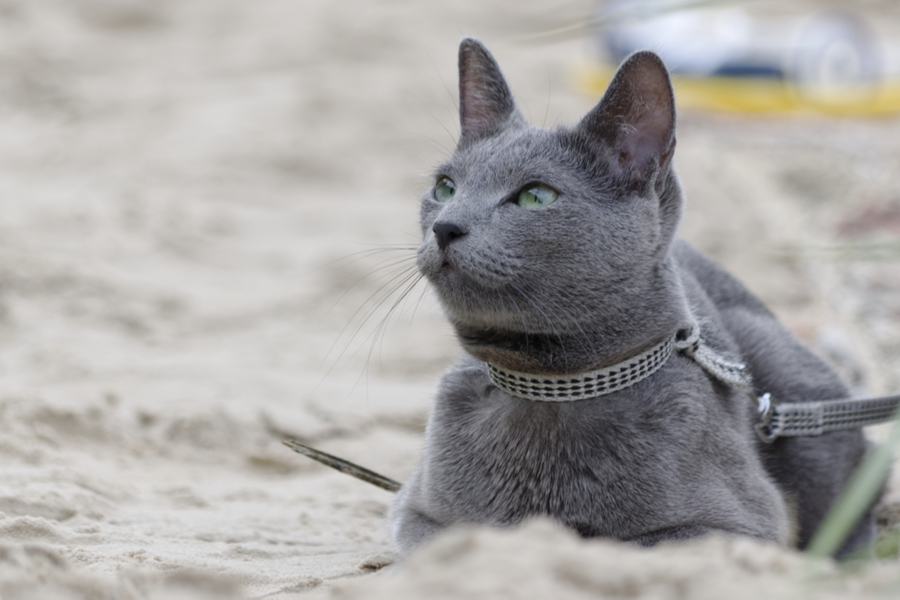
January 17, 2024
What Is The Personality Of Russian Blue Cats?
Russian Blue cats are most known for their distinctive shimmery blue-silver coat and piercing green eyes. However, this breed’s calm and gentle temperament is what makes them shine the most in the feline world.
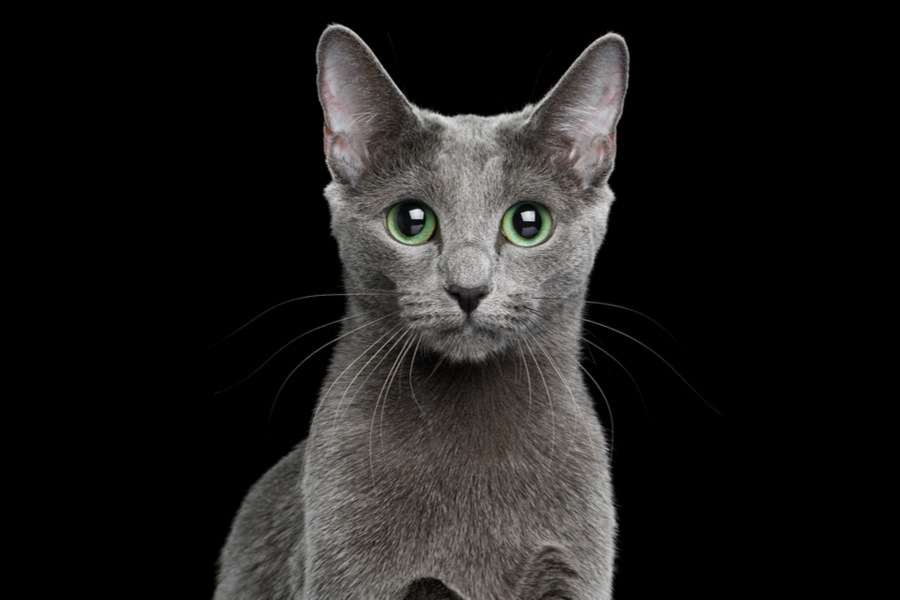
January 17, 2024
10 Facts About Russian Blue Cat Breed
Russian Blues are one of the most aesthetically stunning cat breeds, with a gorgeous plush silvery coat and vibrant green eyes. However, it’s not only their appearance that is beautiful; their nature is too.
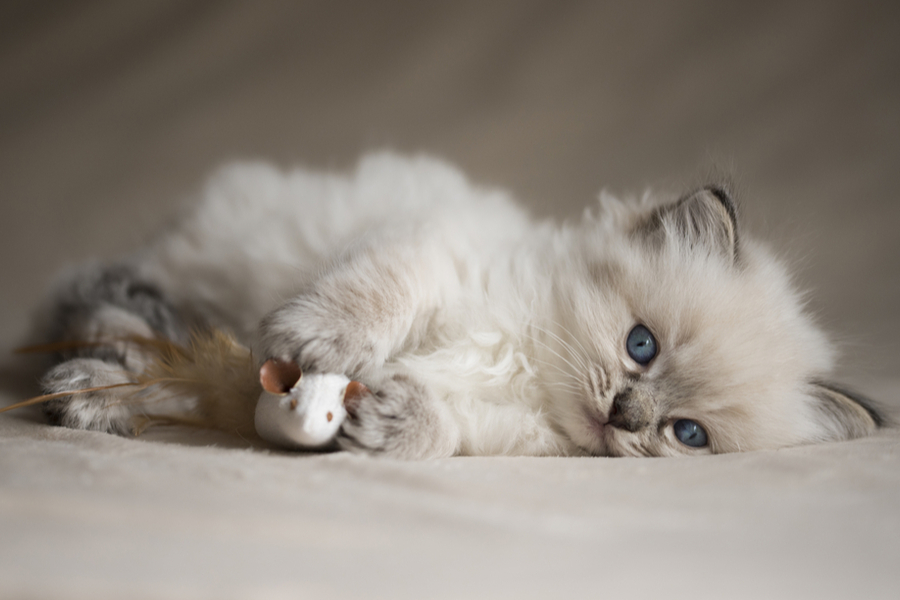
January 17, 2024
How To Choose The Right Cat Breed for You
Cats can make the most fantastic animal companions; they are adorable, friendly, and loving. However, not all felines are created equal. There are many different breeds, of which each has its unique personality traits.
Need some help?
Contact us to speak to our friendly advisor, who will gladly help you find your dream pet!



We are registered in England and Wales under registration number 12568840,
and our registered office is at 58-60 Kensington Church Street, W8 4DB London, England.
© 2023 The Pedigree Paws